实用听说教程(第二版)1 Unit1_教案
- 格式:doc
- 大小:54.00 KB
- 文档页数:2
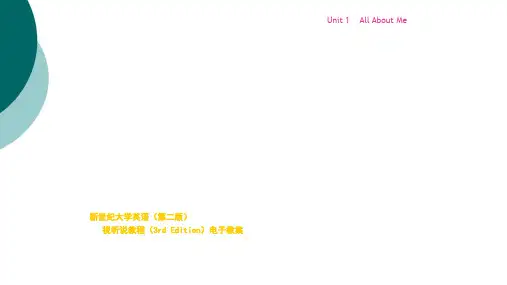
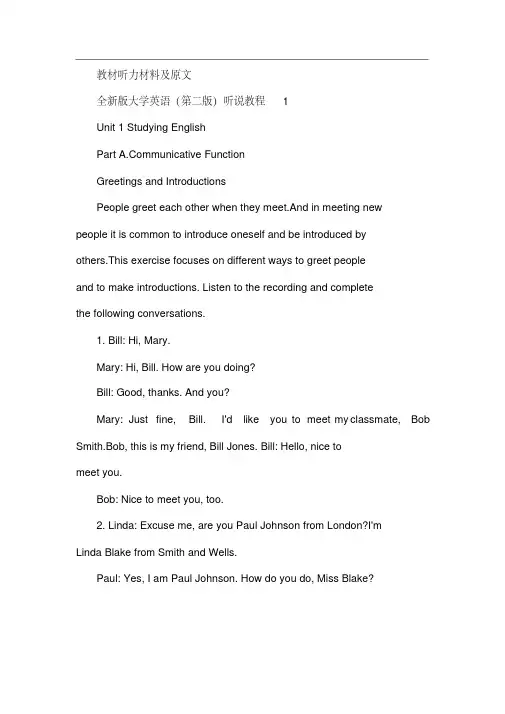
教材听力材料及原文全新版大学英语(第二版)听说教程 1Unit 1 Studying EnglishPart municative FunctionGreetings and IntroductionsPeople greet each other when they meet.And in meeting newpeople it is common to introduce oneself and be introduced byothers.This exercise focuses on different ways to greet peopleand to make introductions. Listen to the recording and completethe following conversations.1. Bill: Hi, Mary.Mary: Hi, Bill. How are you doing?Bill: Good, thanks. And you?Mary: Just fine, Bill. I'd like you to meet my classmate, Bob Smith.Bob, this is my friend, Bill Jones. Bill: Hello, nice tomeet you.Bob: Nice to meet you, too.2. Linda: Excuse me, are you Paul Johnson from London?I'mLinda Blake from Smith and Wells.Paul: Yes, I am Paul Johnson. How do you do, Miss Blake?Linda: How do you do, Mr. Johnson? May I introduce CharlesGreen to you?He's our sales manager. Paul: Pleased to meet you,Mr. Green.Mr. Green: It's a pleasure to meet you.3. Jack: Mum, I've brought one of my friends.Mother: Ask him in, Jack.Jack: Come and meet my family, Tom. Mum, this is Tom, my roommate.Mother: Hello, Tom. It's good to know you.Tom: How do you do, Mrs. Brown?Jack: And this is my sister, Jane.Listening StrategyDetecting Incomplete PlosionIn connected speech when a plosive consonant like /k/, /g/,/t/, /d/, /p/, /b/is followed by another consonant, it is not fully pronounced.This is called incomplete plosion.Listen and read after the recording,paying attention to theletters in italics.1. Laura is one of the top students in Grade One.2. Ted likes to sing English pop songs.3. Listening is not a big problem for me.4. Frank can speak six languages fluently.。
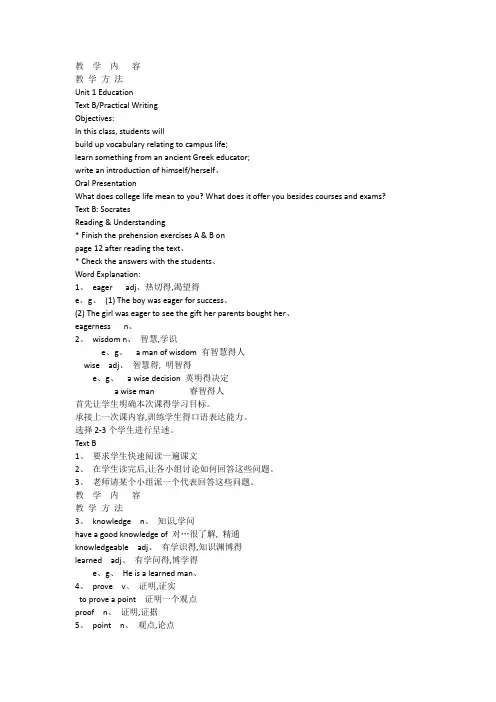
教学内容教学方法Unit 1 EducationText B/Practical WritingObjectives:In this class, students willbuild up vocabulary relating to campus life;learn something from an ancient Greek educator;write an introduction of himself/herself、Oral PresentationWhat does college life mean to you? What does it offer you besides courses and exams? Text B: SocratesReading & Understanding* Finish the prehension exercises A & B onpage 12 after reading the text、* Check the answers with the students、Word Explanation:1、eager adj、热切得,渴望得e、g、(1) The boy was eager for success、(2) The girl was eager to see the gift her parents bought her、eagerness n、2、wisdom n、智慧,学识e、g、 a man of wisdom 有智慧得人wise adj、智慧得, 明智得e、g、 a wise decision 英明得决定a wise man 睿智得人首先让学生明确本次课得学习目标。
承接上一次课内容,训练学生得口语表达能力。
选择2-3个学生进行呈述。
Text B1、要求学生快速阅读一遍课文2、在学生读完后,让各小组讨论如何回答这些问题。
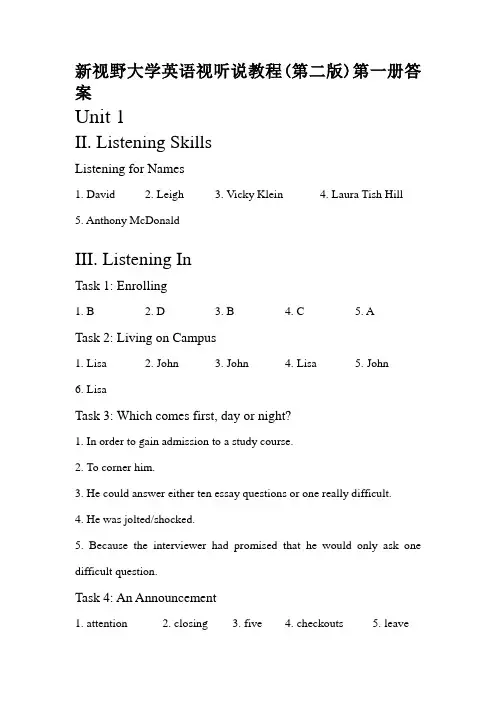
新视野大学英语视听说教程(第二版)第一册答案Unit 1II. Listening SkillsListening for Names1. David2. Leigh3. Vicky Klein4. Laura Tish Hill5. Anthony McDonaldIII. Listening InTask 1: Enrolling1. B2. D3. B4. C5. ATask 2: Living on Campus1. Lisa2. John3. John4. Lisa5. John6. LisaTask 3: Which comes first, day or night?1. In order to gain admission to a study course.2. To corner him.3. He could answer either ten essay questions or one really difficult.4. He was jolted/shocked.5. Because the interviewer had promised that he would only ask one difficult question.Task 4: An Announcement1. attention2. closing3. five4. checkouts5. leaveIV. Speaking OutModel 1 It’s nice to meet you.1 My name is2. Nice to meet you3. But you can call me4. OK5. Are you an international student6. I got here7. we’re going to beModel 2 How are you doing?1.3.Model 3 I’d like you to meet my friend.1.3.VI. Further Listening and SpeakingListeningTask 1: University LifeUniversity life is a new and different experience for me. First of all, living at the university gives me a sense of responsibility, of being on my own. My parents aren’t around to say, “No, you’re not going out tonight.”I decide everything for myself. Being around lots of friendly people is another aspect I like about university life. On my first say, when I arrived on campus, I was a bit confused about where I was going. An upperclassman noticed out I was looking for my dorm, he said, “Oh, just follow me; that’s where I’m going.” Now, I can really say that I feel comfortable in the dorm because there are so many friendly people around to talk with. Finally, I LOVE HA VING Fridays off; I would not be able to deal with five days of classes in a row. How did I do it in high school? I love sleeping in on Fridays. I guess I’m sort of a party animal, but it seems like I go out every Thursday night. It also seems like I don’t get home until early the next day1 Myhead hits the pillow and I don’t move until Friday afternoon.1.new and different2.on his own3. a bit confused4.talk with5.sleep inTask 2: Listening effectively。
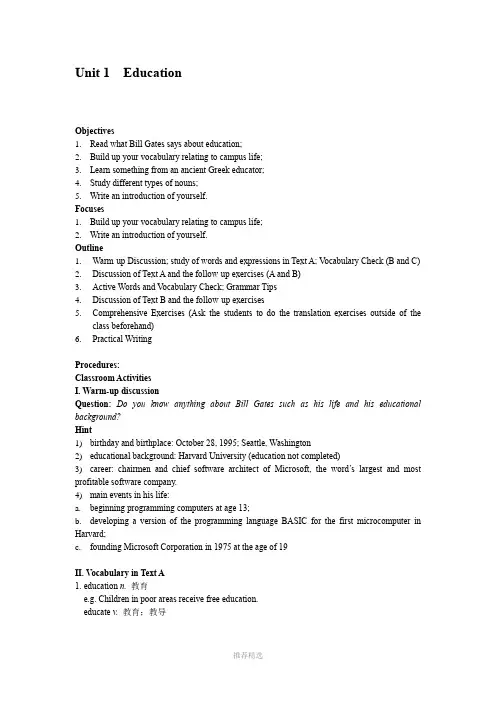
Unit 1 EducationObjectives1.Read what Bill Gates says about education;2.Build up your vocabulary relating to campus life;3.Learn something from an ancient Greek educator;4.Study different types of nouns;5.Write an introduction of yourself.Focuses1.Build up your vocabulary relating to campus life;2.Write an introduction of yourself.Outline1.Warm-up Discussion; study of words and expressions in Text A; Vocabulary Check (B and C)2.Discussion of Text A and the follow-up exercises (A and B)3.Active Words and V ocabulary Check; Grammar Tips4.Discussion of Text B and the follow-up exercisesprehensive Exercises (Ask the students to do the translation exercises outside of theclass beforehand)6.Practical WritingProcedures:Classroom ActivitiesI. Warm-up discussionQuestion: Do you know anything about Bill Gates such as his life and his educational background?Hint1)birthday and birthplace: October 28, 1995; Seattle, Washington2)educational background: Harvard University (education not completed)3)career: chairmen and chief software architect of Microsoft, the word’s largest and most profitable software company.4)main events in his life:a.beginning programming computers at age 13;b.developing a version of the programming language BASIC for the first microcomputer in Harvard;c.founding Microsoft Corporation in 1975 at the age of 19II. Vocabulary in Text A1. education n.教育e.g. Children in poor areas receive free education.educate v.教育;教导educated adj.受教育的e.g. a well-educated maneducator n.教育家,教育者2. count v.派用场,点数e.g. 1) Every seconds counts.2) What counts more is whether you have tried your best.3) to count from 1 to 1004) Count these apples.3. advantage n.有利条件,好处;优点,优势e.g. This product has many advantages.advantageous adj.有利的,有益的,便利的e.g. It is highly advantageous to us.Phrase: take advantage of 很好的使用;利用e.g. take advantage of all educational opportunitiesAntonym: disadvantage n.不利;不利条件e.g. His bad health is a great disadvantage to him when he looks for work.4. lifetime n.一生,终生e.g. 1) a lifetime guarantee2)lifetime membership3) In my father’s lifetime there have been many changes in the village.5. part-time adj.& adv.兼职的(地)e.g. 1)a part-time job2)He works part-time.full-time adj.全职的e.g. a full-time housewife6. programmer n.程序师,编程员program v.编制程序e.g. Please program the computer to do the job instead of doing it manually(手工操作).7. discourage vt. 不鼓励;使泄气,使失去信心e.g. His parents discouraged him from joining the air force.discouraged adj. 泄气的,失去信心的discouraging adj.使人泄气的,使人失去信心的e.g. 1) If you meet difficulty in your study, don’t be discouraged.2) It is discouraging that I didn’t know how to solve the problem.Antonym: encourage vt.鼓励e.g. I encouraged her to work hard and to try to pass the examinations.courage n. 勇敢,勇气e.g. David showed great courage when he saved the child from the burning house.8. diploma n. 文凭,毕业证书e.g. a college diplomadiplomatic adj. 外交的,从事外交的e.g. Julia joined the diplomatic service after her graduation from university.9. project n.项目,课题e.g. 1) an impossible project2) The professor is directing a research project.Synonym: plan10. highly adv. 高度地;非常e.g. 1) a highly interesting story2) a highly paid jobPhrase: speak/ think highly of 赞扬,对…给予很高评价e.g. The leader speaks / thinks highly of our work.11. focus v.(使)集中;(使)聚焦e.g. 1) to focus (one’s mind) in work2) All eyes focused on the speaker.focus n.(兴趣活动等的)中心,焦点e.g. Because of his strange clothes, he immediately became the focus of attention when heentered the office.12. range n. 范围e.g. You have a wide range of choices.range vi.在某范围内变化e.g. The temperature ranges from 10 to 20 degrees.13. attend v.参加,出席e.g. attend schoolattend a lectureattendance n.出席,到场14. automatically adv.自动地e.g. the machine operates automatically.automatic adj.自动的e.g. We have an automatic washing machine.15. drop out of 退学,不参与,退出e.g. 1) He dropped out of school at the age of 10 because his family was too poor to afford thetuition.2) She decided to drop out of the competition because it was not fire.16. chance of a lifetime 千载难逢的良机,一生中唯一的机会e.g. It’s the chance of a lifetime. You will regret it the rest of your life if you don’t take it.17. try out 试验,考验e.g. She bought a cookbook and tried out a few new recipes.18. in short 简而言之,总之e.g. In short, you should study hard for a better future.Synonym: in brief/ to sum up/ all in all/ in conclusionIII. Language Points in Text A1.They want to know what to study, or whether it’s Ok to drop out of college since that’s what I did.what to study: This is a wh-word + infinitive structure used as the object, which can be changed into an object clause. Wh-word + infinitive structure can be used as a subject, an object, or an appositive clause(同位语从句),for example:1)How to improve their English is often discussed among the students.2)We haven’t decided when to visit the place.3)You haven’t answered my question about where to get these books.it’s Ok to drop out of college: Here “it” is used as a formal subject, and the actual subject is the infinitive structure “to drop out of college”. The general pattern is “It is + adj. + (for/ of + sb.) to do sth.” More examples:1)It was very thoughtful of her to come to see me when I was ill.2)It’s easy for me to see through his trick.that’s what I did: “what I did” here is a predictive clause (表语从句)introduced by “what”. It is always structured in the form of “subject + be/ look/ remain/ seem + predictive clause” and can be introduced by such words as “that” (always omitted), and other wh-words, for example:1) It seems (that) it is going to rain.2) This is why I refused to attend the meeting.2. As I’ve said before, nobody should drop out of college unless they believe they face the chance of a lifetime.As I’ve said before: This is a non-restrictive relative clause(非限制性关系从句) introduced by “as”(正如…的那样), which can be placed at the beginning or at the end of the sentence. More examples:1) As people expected, she was admitted to Beijing University.2) Hundreds of people were killed in the earthquake, as I have learned from the newspaper. unless: is a conjunction for an adverbial clause of condition (条件状语从句), which equals “if…not…”(除非).e.g. I won’t leave unless the rain stops.3. In my company’s early years, we have a bright part-time programmer who planned to drop out of high school to work.planned to: intend to do sth.计划、打算做某事e.g. I plan to make a trip to Beijing during the summer vocation.who planned to …work: a restrictive relative clause introduced by “who” since its antecedent is a person and serves as the subject in the clause. The relative pronoun “that” can be used here too. More examples:1) The young man who sits there quietly is my brother.2) I don’t like people that pry into others’ private business.4. Having a diploma certainly helps somebody who is looking to us for a job.look to sb./ sth.: to depend on sb. or sth. for help or advice 指望,依赖e.g. We look to you for support.5. High school and college offer you the best chance to learn many things and to do projects with others that teach you about team spirit.that teach you about team spirit: This is a restrictive relative clause introduced by “that”, whose antecedent acts as the subject of the clause. Actually the relative clause introduced by “that” can be used to modify both the person or the thing, and the roll of “that” can be either the subject or the object.e.g. He was the only one that I knew there.I haven’t been to the place that you have mentioned.6. In high school there was a time when I was highly focused on writing software, but for most of my high school years I had many interests.when …software: This is a relative clause introduced by the relative adverb “when”, which acts as the adverbial of time in the clause.e.g. 1) There was a time when I completely lost my self-confidence.2) I will never forget those days when we were together.7. For me, classroom is not the only place where you can learn.where you can learn: This is a restrictive relative clause introduced by the relative adverb “where”, which is used as the adverbial of place in the clause.e.g. 1) Do you still remember the restaurant where we had dinner last night?2) This is the place where he stayed his whole life.8. In short, it’s a real mistake not to take the chance to study a wide range of subjects and to learn to work with other people because education does count.it’s a real mistake not to take the chance: This is an example of a negative infinitive structure, where “not” is placed before an infinitive.e.g. 1) We are asked not to speak loudly in class.2) It is a good idea not to go out on such a rainy day.IV. Focus on Grammar名词(Noun )一、名词的概念表示人、事物或抽象概念的词叫做名词。
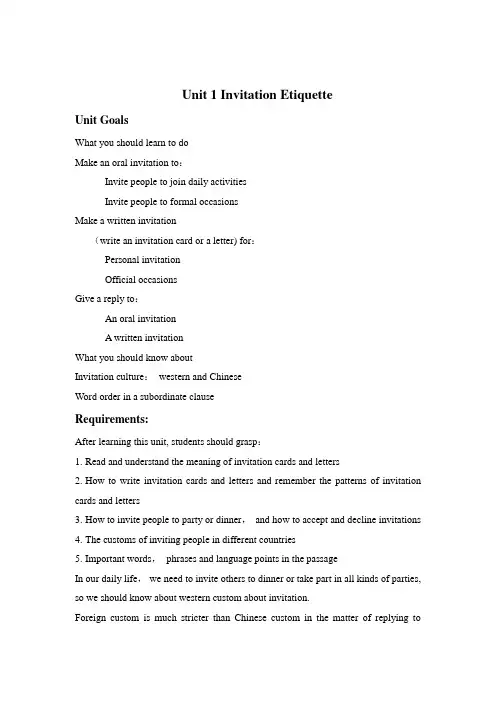
Unit 1 Invitation EtiquetteUnit GoalsWhat you should learn to doMake an oral invitation to:Invite people to join daily activitiesInvite people to formal occasionsMake a written invitation(write an invitation card or a letter) for:Personal invitationOfficial occasionsGive a reply to:An oral invitationA written invitationWhat you should know aboutInvitation culture:western and ChineseWord order in a subordinate clauseRequirements:After learning this unit, students should grasp:1.Read and understand the meaning of invitation cards and letters2.How to write invitation cards and letters and remember the patterns of invitation cards and letters3.How to invite people to party or dinner,and how to accept and decline invitations4.The customs of inviting people in different countries5.Important words,phrases and language points in the passageIn our daily life,we need to invite others to dinner or take part in all kinds of parties, so we should know about western custom about invitation.Foreign custom is much stricter than Chinese custom in the matter of replying toinvitations。
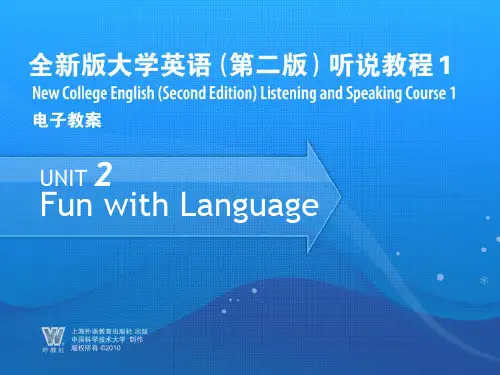
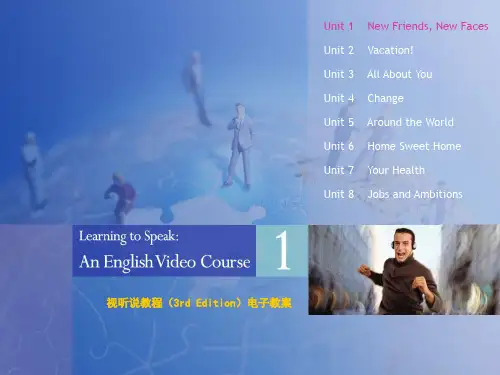
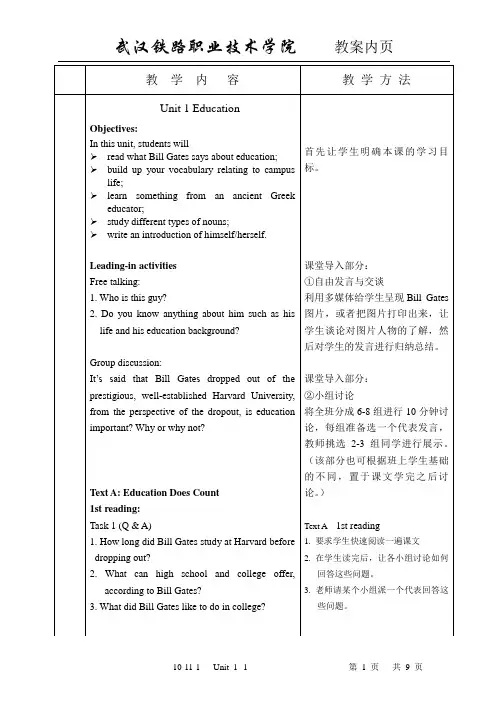
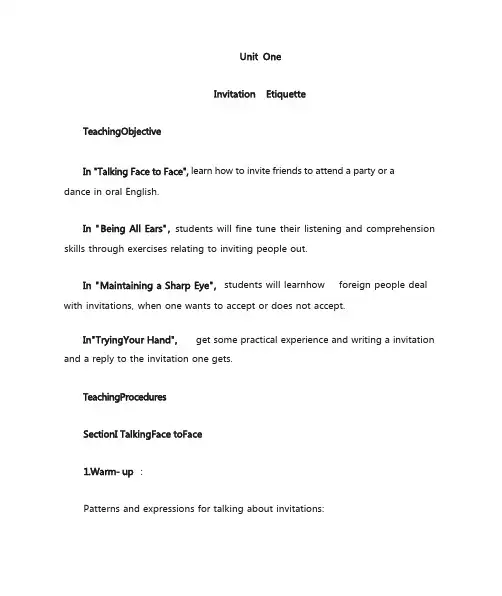
dance in oral English.students will fine tune their listening and comprehensionskills through exercises relating to inviting people out.with invitations, when one wants to accept or does not accept.and a reply to the invitation one gets.Patterns and expressions for talking about invitations:I’dliketoinviteyoutodinner.我想请你吃晚饭。
Why don’t you come and join us for disco?你为什么不和我们一起跳迪斯科?It’s very kind of you to invite me.谢谢你邀请我。
How nice of you! Many thanks.你真好!多谢。
I’dlove to. That wouldbe grea t.我很愿意去。
太好了!Oh, dear, I’m afraid I’m busy tonight. Perhaps tomorrow evening?哦,亲爱的,今晚我很忙。
明晚也许可以吧?Could you make it another time, perhaps next Sunday?你能改个时间吗,下个星期天怎样?It’s very kind of you, but you see I’ll have to prepare for my exam.非常感谢,可你知道我得准备考试。
I’m sorry I can’t, but thank you all the same.真抱歉,我不能去。
可还是要谢谢你。
Wouldyoulike to … ?您愿意…吗?I’dlike toinvite youto …我想邀请你参加…?I would like to know if you could come to …?我想知道你是否能来…May I invite you to …?敬请光临…Wouldit be possible tojoinus for… ?请问你是否能光临…?Would it be convenient to take part in …?请问你是否方便参加…?I was wondering if you would be interested in …?不知你是否有兴趣参加…?Thank you. I’ll be happy to come.谢谢.我很高兴接受你的邀请.I’dlove to. That wouldbe grea t.我很愿意去.太好了.Thank you for invitation.谢谢你的邀请.I’dbe gladtocom e.我很高兴前往.I’d love to, but I can’t come.我很想参加,但是不能来.Thank you for your invitation, but I don’t think I can make it.感谢你的邀请,但我恐怕不能赴约.Unfortunately,I’malready busy that day.很遗憾,我那天事情太多了.It’s very kind of you, but you see I’ll have to prepare for my exam.非常感谢,可你知道我得准备考试。

视听说教程1(第二版)答案Uni t1-10新视野大学英语视听说教程 1[第二版 ]答案(标准答案,正确率 100% )Unit1Lead-in Task1 这个不计入分数Listening skills Task 1. Listening5.Anthony McDonald146Speaking out > Model 1 这个不计入分数Speaking out > Model 2 这个不计入分数Speaking out > Model 3 这个不计入分数Let's talk > Task 1 这个不计入分数Let's talk > Task 2 这个不计入分数Let's talk > Task 3 这个不计入分数Further listening and speaking > Further listening > Task 1for names : 1.David 2.Leigh3.Vicky Kleinura Tish Hill Listening in > Task 1 1-5 BDBCAListening in > Task 2 John 选择235 Lisa 选择Listening in > Task 3 这个不计入分数Listening in > Task 4 1-5 attention closing fivecheckouts leave1-5 new and differenton his own a bitconfused talk with sleep inFurther listening and speaking > Further listening > Task 2 1-5FTTFTFurther listening and speaking > Further speaking > Task 1这个不计入分数Unit Test 按照顺序:BDCDB 1.all right 2. better 3.meet4.how's5. magir6. what about DBCAC AACBD DCADB CCBDA DCBCB DCourse resources 这个不计入分数Unit2Lead-in Task1 这个不计入分数Lead-in Task2 从左到右从上到下baseball basketball kickboxing tennis tai chi jogging skiing swimmingListening skills Task 1. Id entifying numbers :1-5 DACBDListening in > Task 1 1-5 DBCDAListening in > Task 2 1-6 strong and healthyand needs carefulListening in > Task 3 这个不计入分数Listening in > Task 4 1-6 open checkup apply Department opportunitySpeaking out > Model 1 这个不计入分数Speaking out > Model 2 这个不计入分数Speaking out > Model 3 这个不计入分数Let's talk > Task 1 Jack (rooting for the home team)team ) 选择 136Let's talk > Task 2 这个不计入分数Let's talk > Task 3 这个不计入分数Further listening and speaking >Further l local clubs weekly three fan baseFurther listening and speaking >Further FTTFTFurther listening and speaking > Further speaking > Task 1 这个不计入分数energybetter different tastes interestedPEexercise istening > Task 1 1-5popular biglistening > Task 2 1-5 选择 245 Jim (rooting for the visitingUnit Test 按照顺序:CDCAC 1.down 2.turn 3. almost 4.welcome BCABD DCBAD BACAC ADCBD BCBCCourse resources 这个不计入分数Unit3Lead-in Task1 DCAEFBListening skills Task 1.:1-5 DBCABListening in > Task 1 1-5 CADDBListening in > Task 2 1-5 confident making friends language informal cultural course work going for to join in commonListening in > Task 3 这个不计入分数Listening in > Task 4 1-6 The Students Friendship Association outing school gate6:40 7:00 sharp on timeSpeaking out > Model 1 这个不计入分数Speaking out > Model 2 这个不计入分数Speaking out > Model 3 这个不计入分数Let's talk > Task 1 Jack 选择2347 Jane 选择156Let's talk > Task 2 这个不计入分数Let's talk > Task 3 这个不计入分数Further listening and speaking > Further listening > Task 1 1-5 run at terrible sadness a big smile killing himself one small gestureFurther listening and speaking > Further listening > Task 2 1-5TFFTTFurther listening and speaking > Further speaking > Task 1 这个不计入分数Unit Test 按照顺序BCBDD won expect hard agree gainCBADC BDCAD CBACDCourse resources 这个不计入分数Unit4Lead-in Task1 从左到右从上到下foggy clear snowing a tornado raining lightningLead-in Task2 这个不计入分数Listening skills Task 1. s:1-5 668130487 843920571 130321085985 543621963 205 0111305516108978 Listening in > Task 1 1-5 BDCADListening in > Task 2 Man 选择2456 Woman 选择13 Listening in > Task 3 这个不计入分数Listening in > Task 4 1-9 Sunny daytime temperature drop cloudy winds snow flurries 37 rainshowers riseSpeaking out > Model 1 这个不计入分数Speaking out > Model 2 这个不计入分数Speaking out > Model 3 这个不计入分数Let's talk > Task 1 Michael 选择1237 Emma 选择4568Let's talk > Task 2 这个不计入分数Let's talk > Task 3 这个不计入分数Further listening and speaking > Further listening > Task 1 1-5 season Climate thinking mental abilities summerFurther listening and speaking > Further listening > Task 2 1-5FTTFTFurther listening and speaking > Further speaking > Task 1 这个不计入分数Unit Test 按照顺序ACBDA would you like love last trust take care BBCAD BDDAC ADBCD ABABCourse resources 这个不计入分数Unit5Lead-in Task1 从左到右从上到下pizza meatballs hamburger fish braised in brown sauce fried bread stick French fries Spaghetti dumplings tofuLead-in Task2 这个不计入分数Listening skills Task 1.:1-5 steak eggs bacon toast sweet weight cookies fruits strawberries fish fried noodles mushroom Listening in > Task 1 1-5 CDDBDListening in > Task 2 Man 选择1234 Woman 选择56 Listening in > Task 3 这个不计入分数Listening in > Task 4 1-7 favorite McDonald's foods adding dream come true Great choices Double Cheeseburger PiesSpeaking out > Model 1 这个不计入分数Speaking out > Model 2 这个不计入分数Speaking out > Model 3 这个不计入分数Let's talk > Task 1 John 选择1345 Susan 选择267 Let's talk > Task 2 这个不计入分数Let's talk > Task 3 这个不计入分数Further listening and speaking > Further listening > Task1-5 1national international national dishesforeign ones large cities European Asian hamburgers hot dogs Paris tea coffee milk pop children three or four hamburgers fried chickenFurther listening and speaking > Further listening > Task 2 1-5TFFTFFurther listening and speaking > Further speaking > Task 1 这个不计入分数Unit Test 按照顺序:CDBCAC brings seldom ache recommended light change habits fit concern BCABD ACAAC ABBADCCCourse resources 这个不计入分数Unit6Lead-in Task1 从左到右Healthy living habits: Exercising 30 minutes every daySleeping eight hours every dayEating fishDrinking one glass of water when waking up Taking the stairs instead of the elevator Unhealthy living habits:Skipping breakfastKeeping unhealthy snacks in the houseEating few fruits and vegetablesEating fast foodSmokingLead-in Task2 这个不计入分数Listening skills Task 1. :1-5 the doctor's health cold medicine exercise schoolwork feelings physical sleepingrisking Listening in > Task 1 1-5 ACBBCListening in > Task 2 1-7 Want to sleep all day Not interestedcustoms body language blood pressuresome time her ownculture Listening in > Task 3 这个不计入分数Listening in > Task 4 1-6 make an appointment checkupcancellation 3 o'clock 3:30 ThursdaySpeaking out > Model 1 这个不计入分数Speaking out > Model 2 这个不计入分数Speaking out > Model 3 这个不计入分数Let's talk > Task 1 Mike 选择 146 Nancy 选择 2357 Let's talk > Task 2 这个不计入分数Let's talk > Task 3 这个不计入分数Further listening and speaking > Further listening > Task 1 1-5medical service health insurancemedical advice healtha doctor outside long and healthysecond-hand smokecancer lessjunk food exercise enjoy operationoutside make the arrangements medical assistance housing off campusliving on campusFurther listening and speaking > Further listening > Task 2 1-5TFFFTFurther listening and speaking > Further speaking > Task 1 这个不计入分数Unit Test 按照顺序AACDB used spicy stomachaches sick terrible well busy advice check up care something call BACCD CDABC AADDA ACAAAACourse resources 这个不计入分数Unit7Lead-in Task1 这个不计入分数Listening skills Task 1-5 BAADBListening in > Task 1 1-5 BCBCDListening in > Task 2 Man 选择236 Woman 选择145 Listening in > Task 3 这个不计入分数Listening in > Task 4 1-9 Gift Shop gifts friends dolls art prints hand-made daily topprofessional at a discount ofSpeaking out > Model 1 这个不计入分数Speaking out > Model 2 这个不计入分数Speaking out > Model 3 这个不计入分数Let's talk > Task 1 Jack 2348 Jane1567Let's talk > Task 2 这个不计入分数Let's talk > Task 3 这个不计入分数Further listening and speaking > Further listening > Task 1 1-5tolerate complaint do any good worksdissatisfied customers longer harder settledCustomer Service solve problems the right ina timely mannerFurther listening and speaking > Further listening > Task 2 1-5FFTFTFurther listening and speaking > Further speaking > Task 1 这个不计入分数Unit Test 按照顺序CBDAC store sale worth tourism interested present travel break Besides off else pick BBCDA CACBD ABBCB ACDCCourse resources 这个不计入分数Unit8Lead-in Task1 这个不计入分数Listening skills Task 1. 1- 5BABBBListening in > Task 1 1-5 CABDBListening in > Task 2 1-10 bedroom living room kitchen new hardwood in the front campus the city 650TwoListening in > Task 3 这个不计入分数Listening in > Task 4 1-1320-year-old twothree-bedroom preferred responsible respectful north walking distance private airconditioning high-speed $275 utilitiesSpeaking out > Model 1 这个不计入分数Speaking out > Model 2 这个不计入分数Speaking out > Model 3 这个不计入分数Let's talk > Task 1 这个不计入分数Let's talk > Task 2 这个不计入分数Let's talk > Task 3 这个不计入分数Further listening and speaking > Further listening > Task 1 1-5on campus air-conditioned rooms 339 theeducational program a living unit eat and sleep all parts of the country assigned to rooms make newfriends national origin make newfriends educational activities students'development the sound education citizenshipFurther listening andspeaking > Further listening> Task 2 1-5TFTTFFurther listening and speaking > Further speaking > Task 1 这个不计入分数Unit Test 按照顺序CABAC around quiet kind hearted helping far distance takes perfect get alongwith better deposit meet clean BCDAAAABBA DBDBAAB Course resources 这个不计入分数Unit9Lead-in Task1 这个不计入分数Listening skills Task 1.: 1. -5DCABCListening in > Task 1 1-5 ADAACListening in > Task2MAN 选择1346 WOMAN 选择25Listening in > Task 3 这个不计入分数Listening in > Task41-8honored as o ur guestcomputer hacking protect books and articles misuse New Threats toSecurity rouse your interestSpeaking out > Model 1 这个不计入分数Speaking out > Model 2 这个不计入分数Speaking out > Model 3 这个不计入分数Let's talk > Task 1 John1247 Anne3568Let's talk > Task 2 这个不计入分数Let's talk > Task 3 这个不计入分数Further listening and speaking > Further listening > Task 1 1-5similar services more efficiently bricks and mortar bricks and mortar local bank grocery shoppingFurther listening and speaking > Further listening > Task 2 1-5FTTFTFurther listening and speaking > Further speaking > Task 1 这个不计入分数Unit Test 按照顺序ADBCB fixed searching paper down library far saves type point depend on enjoy chat study ABDDCACCAA BABCA DBCCourse resources 这个不计入分数Unit10Lead-in Task1 从左到右从上到下Christmas Chinese New Year Dragon Boat holiday Mothers' day Halloween Mid-Autumn Festival Valentine's dayListening skills Task 1. trip uncle HongKong driving funListening in > Task 1 1-5 ACCDCListening in > Task 2 john145 Jane236Listening in > Task 3 这个不计入分数Listening in > Task 4 1-7 aboard Disneyland meantime point out scenic relax Mickey MouseSpeaking out > Model 1 这个不计入分数Speaking out > Model 2 这个不计入分数Speaking out > Model 3 这个不计入分数Let's talk > Task 1 John1378Let's talk > Task 2 这个不计入分数Let's talk > Task 3 这个不计入分数Further listening and speaking > Further l istening > Task 11-5 wars finding soldiers families and lovers love and marriage prison February 14fertility modern meaningsFurther listening and speaking > Further listening > Task 21-5 T FFTTFurther listening and speaking > Further speaking > Task 1 这个不计入分数UnitTest 按照顺序CADBA packing seaside escape rays bring burnt reminding way feel set out visit pity ACBBD BBADC AAACA BCABCCourse resources 这个不计入分数。
We Learn新目标大学英语(第二版)视听说教程1答案Unit1-2Unit1:Embracing College Lifelead-inI.The girl is probably heading off to college. As we can see from the pictures, she is packing up her stuff for college and saying goodbye to her father.II.college remember drive call thanksIII.1.My parents gave me some useful suggestions on adjusting to college life; They asked me to take good care of myself;They encouraged me to enjoy college life and to get the most out of my college years.2.I find everything in college exciting. But it is difficult to manage my time to fit in all my courses;I’m having a great time in college. But I’m a little overwhelmed by the amount of reading required for each course.Listening as Comprehension05task1Exercise1:I guess the six college students might give suggestions on study, time management, or interpersonal relationships.Exercise2:1B 2E 3D 4A 5C 6F06task2Exercise1:The professor introduces some study skills;The professor talks about the differences between high school and college; Students ask questions about problems they have met and the professor offers some suggestions.Exercise2: 1A 2B 3DExercise3: 1Record 2advance 3Cherk 4passwordListening as Acquisition09Exercise21.take up2.prioritize3.keep up with4.dedicate yourself to5.overwhelming10Exercise31.prioritize2.keep up with3.dedicated herself to4.took up5.overwhelming11Exercise41.rack up a bunch of ticketse across problems3.fail the test4.in advance5.turn in homeworkFurther Exploration14Critical ThinkingExercise1:1good grades 2.grow your intelligence 3.struggleExercise2:1.The problem is that if we consider grades to be critically important, we will let the grades define us. This will affect how we school. We probably will study simplyto maintain a GPA instead of learning something new.2.According to the professor, the point of college is to grow students’ intelligence. For those who agree with the professor, their possible answers are as follows:College is intended to help students grow intellectually so students should bravely take on new challenges every day;The goal of higher education is to help students develop the ability to deal with problems and intelligence matters a lot in solving all kinds of problems.For those who disagree with the professor, their possible answers are as follows: Intelligence is important, but the top priority of higher education should be equipping students with qualifications and skills their future jobs might need;GPA may not be everything, but it still serves as a good way to measure students’ performance.15New Report: 1A 2C 3A1.widely popular2.a third of3.creating a space4.Flexibility5.invaluable16Conversation:1C 2D 3C 4B1deepen 2barrier 3interact 4twice 5bug17Passage:1B 2D 3A1Participate 2.body 3.office 4.free 5.valuesUnit2:Learning:In What WayLead-inI.They are probably practicing Kung Fu in a special way. As we can see in picture one, they are making a bow to each other, which is the starting and ending courtesy of Kung Fu. And in picture two, the Master is probably treating Po to his favourite dumplings.II.ACDGIII.1The Master finds out Po’s unique learning style and decides to train him in a way that is most suitable for him. He used to train the Five through strict practices, but he knows that he cannot do the same with Po.2.A good teacher should help students discover their learning styles and flexibly adjust his/her teaching methods so as to help students learn more effectively. Listening as Comprehension05Task1Exercise1: plete 2.Observe 3.distracted 4.visuals 5.focus 6.visualExercise2:A .Reading/Writing BVisual C.Kinaesthetic D.Auditory E.Kinaesthetic F.Auditory G.Reading/Writing H.Visual06Task2Exercise1:1.redefining municate 3.diverse 4.everywhereExercise2: 1 .21st 2.2000 3.35 4.2 5.1000Exercise3:1.digital textbooks 2.school attendance 3.taking exams 4.message each other 5.mentor 6.learning optionsListening as Acquisition09Exercise2: 1.available 2.tend to 3.By the time 4.In response 5.switching to10Exercise3:1.as a reply 2.easily found / available 3.at the moment when / by the time 4.changing her job to / switching to 5.are very likely / tend to11Exercise4 : 1. a globalized world 2.find it easier to 3.personalized learning approaches 4.previous learning experiences 5.prefer watching over listeningFurther Exploration14Critical ThinkingExercise1:1.world 2.workforce 3.career 4.ways of thinking 5.ways of working 6.tools 7.skills for livingExercise2:1. In response 2.be much more about /but also 3.also/as well as st but not leastExercise3:1.The structured outline gives a clear picture of how the ideas are linked by indicating the process and main points. A mind map like what is shown in the video could also be used to organize ideas2.Generally speaking, all the skills mentioned in the video are essential for 21st-century learners. It is always good to have more skills as a Chinese saying goes “Extra skills are no burden (技多不压身)”, but it is also suggested for students to learn them in an organized way.As for learning the given skills, possible suggestions are as follows: In order to be more creative and critical, students should come up with as many questions and ideas as possible in discussion;In order to be more collaborative, students should learn to appreciate other people’s strength and learn from them.15News Report: 1D 2C 3D1F 2F 3T 4T16Conversation: I.1C 2C 3B 4D2.BDE17Passage: 1.1A 2B 3D2.1pops out 2.sign3.highlighted4.Bridge5.same。
新编大学实用英语教程第二册教案unit 1 UNIT1 Teaching Plan序号1课程1班级教师周次课型日期主任签字Unit 1LoveListening , Speaking practicesTeaching Objectives:talking about their relationships at school listening short dialogue and conversation Teaching Important and Difficult Points listening a dialogue and monologues diction and answer questionsTeaching MethodsCommunicative T eaching Method; Audio-visual Teaching Method Teaching AidsMulti-media teaching ,such as audio and video files.Teaching ProcessTeaching process designStep I.(4mins)Match the following pictures to the sentencesStep II. (5mins)discuss what love is with partner.Step III.(3mins)Watch the short video The Other Pair. Answer the following question.Letting it go or holding on, which is better?Step IV.(5mins)Listen to the dialogue and fill in the blanks.Listen to the dialogue again and decide whether the following statements are true (T) or false (F)Step V(5mins)Listen to the monologue and answer the following questions by students.Step VI.(3mins)Listening the monologue again and give the keys to students.Step VII.(3mins)Introducing Festival knowledgeIntroducing Qi Xi Festival and Valentine's DayStep VIII.(2mins)Listen to the radio and read the words and phrases loudly Step IX.(5mins)SpeakingDiscuss what do the students do for their first date. Step IIX.(5mins)BrainstormWatch the video The Other Pair. What is your choice? Leaving the only shoe to the poor boy, or keeping the only shoe as a kind of regretful memory? Discuss with your classmates and share your opinions in the class.Step IIX.(5mins)Listen to the radio about Functional-sentence Bank and repeat loudly.Use the words and phrases in the Brainstorm andFunctional-sentence Bank to prepare a dialogue or brief speech with your partner, and then present it in your class. You may refer to the following situation prompts for ideas.序号2课程1班级教师周次课型日期主任签字Unit 1LoveLead-in; New Words and Text AnalysisTeaching Objectives:retell the main idea of the passageto comprehend the new words and phrases of text Ause the suitable forms of words or phrases to fill in the blanks in sentenceshave a idea of some grammar which had appeared in the text ATeaching Important and Difficult PointsWords and Phrases of A and B level;Sentence structure and words forms;Difficult Sentence Analysis and main idea of textTeaching MethodsPresentation; Communicative Teaching Method; Audio-visual Teaching MethodTeaching AidsMulti-media teaching ,such as audio and video files.Teaching ProcessTeaching process designStep I.(3mins)Pre-reading QuestionsChoose students to answer the pre-reading questions.Step II. (7mins)Step I Lead in of text ALet students fast reading the text and summary the main idea of whole passage and each paragraph,Main Idea of whole passage: the passage will tell about the orientation week.ParagraphsMain Ideas1The author receives a gardenia every year.2The author guessed what the giver of flowers might look like.3The author hopes the flower giver is as she thinks.4Mother wants her child to be like a gardenia.5That was the year the gardenias stopped coming.Step III.(18mins)Intensive ReadingStudents read the text again and find out the answers to the while-reading questionsTeacher and students read the words and expressions togetherTeacher explain the sentence structure and grammar of text AWords & Expressions of Text AVocabulary of student bookmystery n.谜;神秘的事物;推理小说e.g. They decided to turn the machines on this mystery virus. 他们决定用新机器测试这个神秘的病毒。